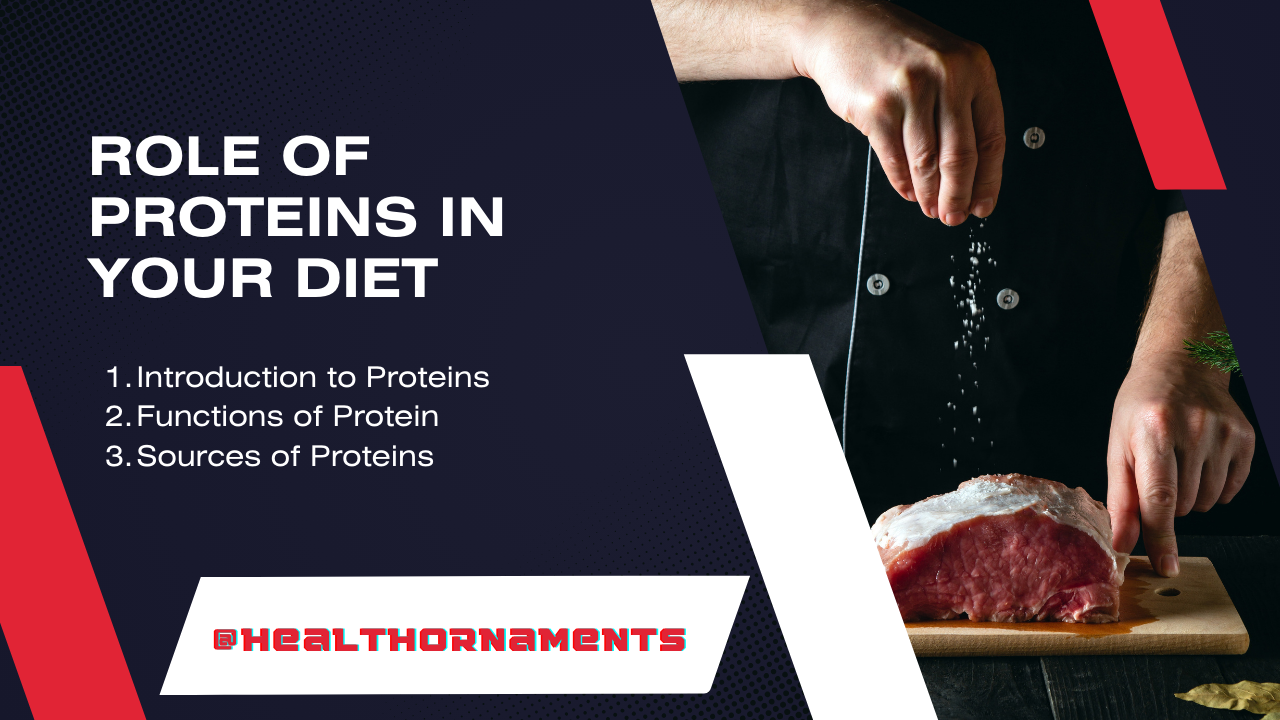Role of Proteins in your diet: The Cornerstone of Life: Proteins, often referred to as the fundamental building blocks of life, are integral to the structure and function of the human body. These intricate molecules play a pivotal role in numerous processes crucial for maintaining our health and overall well-being. In this brief article, we will explore the significance of proteins and why they are rightfully considered the foundation of life.
The Basics of Proteins:
Proteins are complex, large molecules composed of amino acids, with each amino acid acting as a unique component contributing to the overall structure. With 20 different types of amino acids, the sequence in which they combine determines the specific function of the protein. This inherent diversity allows proteins to serve a wide array of roles within the body.
Proteins are the constructing blocks of existence, essential additives that play a fundamental function within the structure and characteristic of dwelling organisms. Information the definition and fundamental structure of proteins gives a key perception into the complicated workings of life on the molecular stage. On this weblog, we embark on a adventure to unravel the mysteries of proteins, exploring their importance, definition, and the essential factors that represent their structure.
1. Definition of proteins:
At its centre, a protein is a complex macromolecule made from amino acids, every related together in a particular collection. These sequences are encoded by using genes and serve a large number of functions vital for the sustenance of lifestyles. Proteins are not best the structural framework of cells however also actively participate in endless biological processes.
Proteins can be enzymes, catalysts that facilitate biochemical reactions; structural additives, supplying guide to cells and tissues; antibodies, defending the frame against pathogens; or hormones, regulating various physiological tactics. This diverse variety of functions underscores the significance of proteins in keeping the sensitive balance of lifestyles.
2. Fundamental shape of proteins:
Please read the Fundamental shape of Proteins
A. Amino acids:
Amino acids are the foundational gadgets of proteins, and there are 20 different sorts commonly determined in nature. Each amino acid includes a vital carbon atom bonded to a hydrogen atom, an amino group, a carboxyl institution, and a variable aspect chain. The individuality of the facet chain distinguishes one amino acid from any other, supplying precise residences to the protein.
B. Peptide bonds:
The linking of amino acids occurs thru peptide bonds, formed with the aid of the dehydration synthesis of the amino and carboxyl groups. This procedure creates a chain of amino acids, normally referred to as a polypeptide chain. The unique sequence of amino acids in the polypeptide chain is decided via the genetic code.
C. Number one, secondary, tertiary, and quaternary structure:
Primary structure: the linear collection of amino acids in a polypeptide chain.
Secondary shape: the folding or coiling of the polypeptide chain into styles inclusive of alpha helices or beta sheets.
D. Tertiary shape:
The overall 3-dimensional shape of a single polypeptide chain.
Quaternary shape: the arrangement of multiple polypeptide chains to shape a useful protein.
Functions of Proteins:
Here is the functions of proteins i am discussing below. please read it properly to maintain a healthy and wealthy diet.
1. Tissue Repair and Growth:
A primary function of proteins is to facilitate the repair and growth of tissues. Whether healing a wound or building muscle post-exercise, proteins are indispensable for these processes.
2. Immune System Support:
Components of the immune system, including antibodies, are predominantly proteins. They play a vital role in safeguarding the body against infections and diseases.
3. Enzymes and Hormones:
Proteins act as enzymes, catalysing biochemical reactions essential for digestion, metabolism, and energy production. Additionally, hormones that regulate various bodily functions often belong to the protein or peptide category.
4. Sources of Proteins:
Proteins can be sourced from both animal and plant origins. Protein sources derived from animals encompass lean meats, poultry, fish, eggs, and dairy products. Plant-based sources encompass legumes, tofu, quinoa, as well as various nuts and seeds. Maintaining a balance between these sources ensures a diverse and comprehensive amino acid profile in one’s diet.
5. Balancing Protein Intake:
Finding the right balance of protein intake is crucial for optimal health. Athletes may require higher protein consumption for muscle repair and growth, while individuals with different goals, such as weight management or overall well-being, should also consider their protein intake. Consulting with a nutritionist or dietitian can help tailor protein consumption to meet specific needs.
Sources of Proteins
Proteins, often referred to as the building blocks of life, play a pivotal role in sustaining our health and well-being. Obtaining an adequate and diverse range of protein sources is crucial for meeting our nutritional needs. In this blog, we embark on a journey to explore the rich tapestry of protein sources available to us, delving into both animal and plant-based options.
I. Animal-Based Protein Sources:-
Here are some examples you can check it out.
A. Lean Meats:
Beef: A classic source of high-quality protein, offering essential nutrients such as iron and zinc.
Poultry (Chicken, Turkey): Lean poultry is rich in protein and lower in fat, providing a versatile option for various dishes.
B. Fish and Seafood:
Salmon: Packed with omega-3 fatty acids and protein, salmon is not only delicious but also promotes heart health.
Tuna: A lean source of protein with the added benefit of being convenient, often available canned.
C. Eggs:
Whole Eggs: Eggs are a complete protein source, containing all essential amino acids, as well as vitamins and minerals.
Egg Whites: Fat-free and high in protein, egg whites are a popular choice for those focusing on lean protein intake.
D. Dairy Products:
Milk: A classic source of protein, calcium, and vitamin D.
Greek Yogurt: Packed with protein and probiotics, Greek yogurt is a nutritious and versatile dairy option.
II. Plant-Based Protein Sources:-
A. Legumes:
Lentils: Rich in protein and fibre, lentils are a staple in many plant-based diets.
Chickpeas: Versatile and protein-packed, chickpeas can be enjoyed in various dishes, from salads to hummus.
B. Nuts and Seeds:
Almonds: A protein-rich nut with the added benefits of healthy fats and antioxidants.
Chia Seeds: Tiny but mighty, chia seeds are a great plant-based protein source and offer omega-3 fatty acids.
C. Tofu and Tempeh:
Tofu: Made from soybeans, tofu is a versatile and protein-rich option for vegetarians and vegans.
Tempeh: Fermented soybean product with a nutty flavour, high in protein and other nutrients.
D. Whole Grains:
Quinoa: A complete protein source, quinoa is a nutritious grain that adds variety to meals.
Brown Rice: A staple in many diets, brown rice provides a moderate amount of protein along with essential carbohydrates.
Incorporating a diverse array of protein sources into our diets ensures that we not only meet our nutritional needs but also enjoy a variety of flavours and textures. Whether sourced from animals or plants, proteins contribute to the maintenance and growth of our bodies, underscoring their importance in promoting overall health. As we explore the world of protein-rich foods, let us savour the nutritional bounty available to us and make informed choices to support our well-being.
Conclusion:
In summary, proteins are the unsung heroes working diligently within our bodies, ensuring everything functions as it should. From tissue repair to immune system support and catalysing biochemical reactions, proteins truly form the foundation of life. Recognizing the importance of incorporating a variety of protein sources into our diets is a pivotal step toward nurturing our bodies and promoting long-term health. As we delve deeper into understanding the intricacies of nutrition, let us appreciate and prioritize the role of proteins in maintaining the delicate balance that sustains life itself.


2 thoughts on “Role of Proteins in your diet: The Cornerstone of Life”